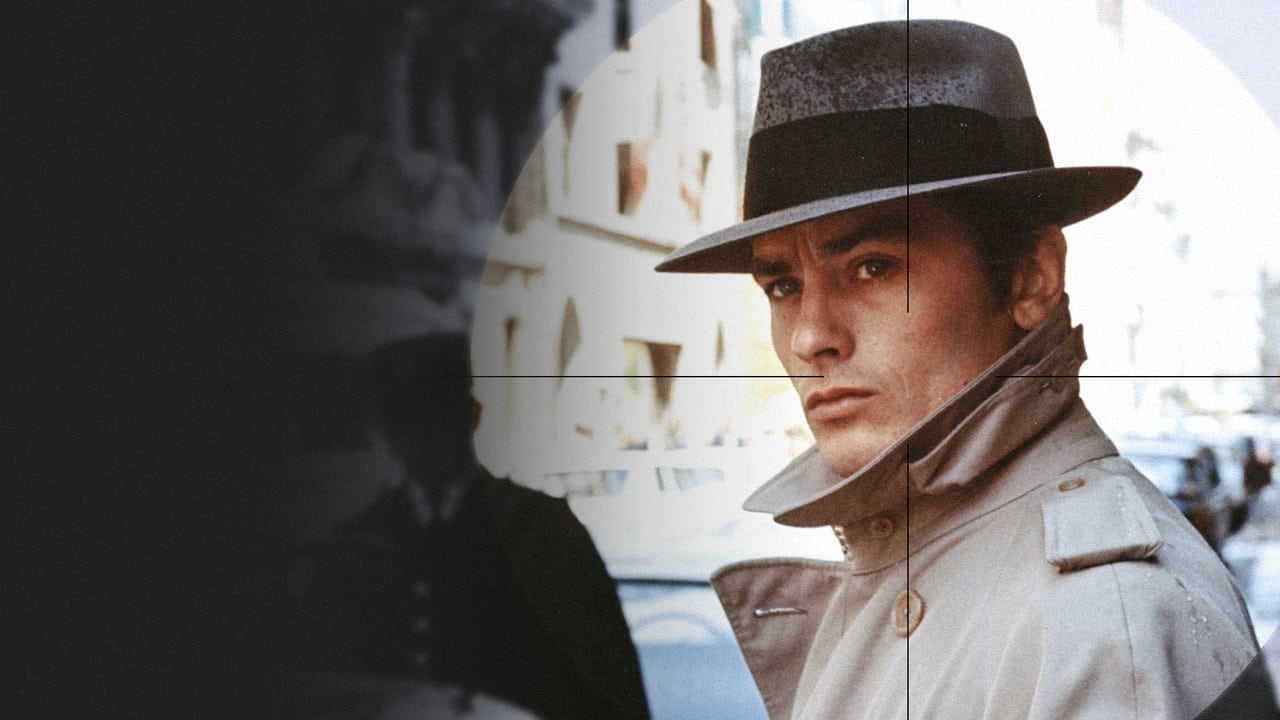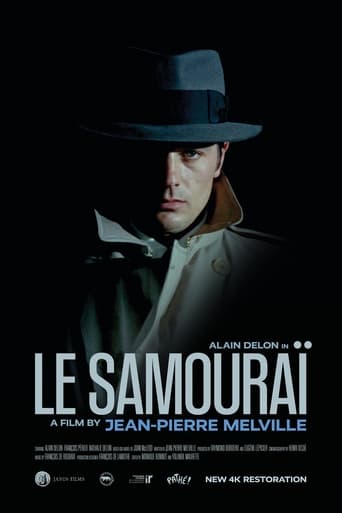

A hitman is hired to execute a nightclub owner . Upon completion several people witness the caped man including the pianist, the bartender, and the host .Police are called in to investigate and the chief detectives orders a roundup of all "suspects" with top hats and overcoats . Due to 50/50 witness testifying and Costello's cold demeanor , the chief orders his men to tail the hitman and uncover his tracks .After Costello's release his employers suspect he may be trailed , and order for his execution aswell . Joe decides to find the people who ordered the hit , before they find him - all the while dodging the police's trails and mouse-trapsThe Caper Thriller that inspired a new-age of filmmakersSlick spy/detective storytelling featuring: staged alibis, police rigging and tracking, contract killer's collaborators8.5/10 -- Classic Crime Drama
... View MoreLE SAMOURAI is a mysterious crime drama film that is made in the pattern of Hollywood gangster films in the noir genre. Mr. Mellville has added several popular details from Japanese culture into a fictitious gangster story. The protagonists, costumes, nightclubs, streets and murders have all the characteristics of the noir genre.Jef Costello lives in a single-room Paris apartment whose spartan furnishings include a little bird in a cage. He is a professional Parisian assassin-for-hire who, by nature of his work's solitary demands, has no friends. Although he is loved by Jane, Costello knows that she already has a lover. After he successfully wipes out a nightclub owner at the behest of his boss, he is seen leaving the scene by several witnesses, including piano player Valérie. Although he survives a police lineup thanks to a lie offered up by the fearless Valerie, Costello's alibi disintegrates rapidly and his shadowy employer takes out a contract on him. He seeks revenge...This is a sort of moral value test in rough circumstances. Namely, the main protagonist is in conflict with the law, his boss and himself. He does not make the difference between human shades. He does what he is paid for, and that, of course, will lead him to his seppuku.This film contains very little dialogue, characterization could have been better, but, the atmosphere is great.Alain Delon as Jef Costello is an attractive man and a cold-blooded killer at the same time. His selfish nature makes him incompetent to life, but unswerving when it comes to his work. Mr. Delon has offered a very good performance.His support are François Périer as a persistent investigating officer, Nathalie Delon (Jane) as a devoted "fiancé", who provides almost perfect alibi, and Cathy Rosier (Valérie) as a brave and enigmatic piano player.The direction is certainly impeccable, however, the plot is a frozen and the romance is improperly superficial.
... View MoreI mistakenly ticked this French film off in the checklist of my book 1001 Movies You Must See Before You Die, so I was lucky to find it, make this tick count and watch the film, I was really looking forward to it, directed by Jean-Pierre Melville (Bob Le Flambeur (Bob the Gambler)). Basically in Paris, Jef Costello (Rocco and His Brothers' Alain Delon) is a professional hit-man, a perfectionist who works under contract who always carefully plans his murders and never gets caught, while his personal life is solitary and lonely, he has no friends whatsoever. Costello's latest assignment is to assassinate the owner of a nightclub, he is successful in killing his target, but is accidentally seen by club pianist Valerie (Cathy Rosier). The police only have a description of what the culprit was wearing, a hat and a trench coat, to work with, Costello is picked up by the police and onstage as part of a lineup, among other men wearing the same clothing, the investigation is led by determined Police Inspector (The Nights of Cabiria's François Périer). The witnesses dismiss the other suspects, only Valérie recognises Costello in the lineup, but she lies that she did not see him, Costello is released also because he has set up an alibi with Jan Lagrange (Natalie Delon). Costello collects the money for killing the club owner, but his employer attempts t kill him for his mistake in getting caught, the Police Inspector puts together a team of undercover agents to follow Costello, as he believes him to be the culprit, the men follow him through the Paris Metro, but the underground labyrinth allows Costello to escape. Costello is determined to be paid for his killing job, and get revenge on the shadowy businessman who hired him, he is also careful to stay one step ahead of the Police Inspector. In the end the decision Costello makes bring him surprising results, he turns up at the nightclub, making no effort to hide himself, he confronts Valérie and points a gun at her, but gunshots are heard, and Costello collapses dead, it is revealed that Costello had emptied his gun before entering the club. Also starring Jacques Leroy as the Gunman, Jean-Pierre Posier as Olivier Rey, Michel Boisrond as Wiener and Robert Favart as the Barman. Delon gives a fantastic performance as the ultimate professional in his preparation and craftsmanship, this works as a great stylish character-study, it is kind of like a classic film noir, there is very little dialogue, only in the necessary scenes, and the acting is subtle, this adds to the nervy atmosphere, it is a most worthwhile thriller. Very good!
... View MoreThe film starts with a silent (almost) ten minute sequence showing a man getting out of bed, stealing another man's car, getting the license plates removed, going to a woman's house and finally, killing a man.What we find out is that this is all a meticulous plan by Jef Costello, a hit-man. This isn't an evil person, however, just one who's personality (or lack there of) makes it so that being a hit-man is the only thing he CAN do. Jef is cold and clinical not only because he has to be, but because that's simply the way he is. He seems emotionally detached and distant, seemingly using people simply as tools to get through the incredibly lonely life he has become a part of. In fact in many scenes where we believe he has some genuine emotion, we seem to be proved wrong, such as when we find out he is not just keeping his pet bird as a pet, but an alarm to warn him of invaders. However, throughout the whole film we see this side of him, but we sense he is not an evil person. He doesn't kill for the joy of killing, but because he is a hit-man and that is what he does. It seems to be the only possible path he could've taken in life. Later, in a scene involving a man invading Jef's house for reasons I won't get into right now, he ends up with a gun pointed at his face. But when he reverses the situation and ends up with the gun in his hand, once he gets the information he needs he doesn't kill the man, although he has no reason not to. It is at this moment when we first begin to see emotion in him. Later when he is fumbling to find the right key for a stolen car in a VERY intense scene, we see genuine fear in his face. In fact, we even find out through clever editing that Jef never kills a man before the other man is about to shoot him. We even find out that Jef actually cares deeply about a woman that he only seemed to be using for an alibi earlier in the film when he shows up at her house for no other reason than to tell her "everything will be OK" as a sort of goodbye before he goes off to kill the man that has been trying to kill him. Once he is done with that, the cops are still on his tail and he knows that he has no hope, so he goes back to the bar where he killed the man in the first scene of the movie. He overtly puts on white gloves, walks up to the woman that betrayed him earlier in the film and pulls out a handgun only to be shot down. However, it is revealed this handgun was unloaded, showing he had no intention of killing her because he can't bring himself to kill a person that is not threatening him, while also showing this was a passive suicide not only to stop the police and criminals from harassing the only woman he cares about, but also showing the woman at the bar what she'd done to him by betraying him.I rambled a lot in this one and I didn't even have time to touch on everything, but the point is this: fantastic character study, incredibly tense thriller, amazingly directed, acted, edited, etc..., and perfect soundtrack. Has the meticulous care of the main character. Pretty much perfect in general.
... View More